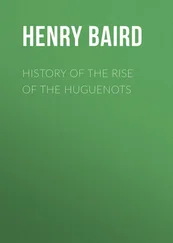John Abbott - Henry IV, Makers of History
Здесь есть возможность читать онлайн «John Abbott - Henry IV, Makers of History» — ознакомительный отрывок электронной книги совершенно бесплатно, а после прочтения отрывка купить полную версию. В некоторых случаях можно слушать аудио, скачать через торрент в формате fb2 и присутствует краткое содержание. Жанр: foreign_antique, foreign_prose, на английском языке. Описание произведения, (предисловие) а так же отзывы посетителей доступны на портале библиотеки ЛибКат.
- Название:Henry IV, Makers of History
- Автор:
- Жанр:
- Год:неизвестен
- ISBN:нет данных
- Рейтинг книги:5 / 5. Голосов: 1
-
Избранное:Добавить в избранное
- Отзывы:
-
Ваша оценка:
- 100
- 1
- 2
- 3
- 4
- 5
Henry IV, Makers of History: краткое содержание, описание и аннотация
Предлагаем к чтению аннотацию, описание, краткое содержание или предисловие (зависит от того, что написал сам автор книги «Henry IV, Makers of History»). Если вы не нашли необходимую информацию о книге — напишите в комментариях, мы постараемся отыскать её.
Henry IV, Makers of History — читать онлайн ознакомительный отрывок
Ниже представлен текст книги, разбитый по страницам. Система сохранения места последней прочитанной страницы, позволяет с удобством читать онлайн бесплатно книгу «Henry IV, Makers of History», без необходимости каждый раз заново искать на чём Вы остановились. Поставьте закладку, и сможете в любой момент перейти на страницу, на которой закончили чтение.
Интервал:
Закладка:
John S. C. Abbott
Henry IV, Makers of History
PREFACE
History is our Heaven-appointed instructor. It is the guide for the future. The calamities of yesterday are the protectors of to-day.
The sea of time we navigate is full of perils. But it is not an unknown sea. It has been traversed for ages, and there is not a sunken rock or a treacherous sand-bar which is not marked by the wreck of those who have preceded us.
There is no portion of history fraught with more valuable instruction than the period of those terrible religious wars which desolated the sixteenth century. There is no romance so wild as the veritable history of those times. The majestic outgoings of the Almighty, as developed in the onward progress of our race, infinitely transcend, in all the elements of profoundness, mystery, and grandeur, all that man's fancy can create.
The cartoons of Raphael are beautiful, but what are they when compared with the heaving ocean, the clouds of sunset, and the pinnacles of the Alps? The dome of St. Peter's is man's noblest architecture, but what is it when compared with the magnificent rotunda of the skies?
John S. C. Abbott. Brunswick, Maine, 1856.Chapter I
Childhood and Youth
Navarre.
Catharine de Foix.
About four hundred years ago there was a small kingdom, spreading over the cliffs and ravines of the eastern extremity of the Pyrenees, called Navarre. Its population, of about five hundred thousand, consisted of a very simple, frugal, and industrious people. Those who lived upon the shore washed by the stormy waves of the Bay of Biscay gratified their love of excitement and of adventure by braving the perils of the sea. Those who lived in the solitude of the interior, on the sunny slopes of the mountains, or by the streams which meandered through the verdant valleys, fed their flocks, and harvested their grain, and pressed rich wine from the grapes of their vineyards, in the enjoyment of the most pleasant duties of rural life. Proud of their independence, they were ever ready to grasp arms to repel foreign aggression. The throne of this kingdom was, at the time of which we speak, occupied by Catharine de Foix. She was a widow, and all her hopes and affections were centred in her son Henry, an ardent and impetuous boy six or seven years of age, who was to receive the crown when it should fall from her brow, and transmit to posterity their ancestral honors.
Ferdinand and Isabella.
Dismemberment of Navarre.
Ferdinand of Aragon had just married Isabella of Castile, and had thus united those two populous and wealthy kingdoms; and now, in the arrogance of power, seized with the pride of annexation, he began to look with a wistful eye upon the picturesque kingdom of Navarre. Its comparative feebleness, under the reign of a bereaved woman weary of the world, invited to the enterprise. Should he grasp at the whole territory of the little realm, France might interpose her powerful remonstrance. Should he take but the half which was spread out upon the southern declivity of the Pyrenees, it would be virtually saying to the French monarch, "The rest I courteously leave for you." The armies of Spain were soon sweeping resistlessly through these sunny valleys, and one half of her empire was ruthlessly torn from the Queen of Navarre, and transferred to the dominion of imperious Castile and Aragon.
Plans for revenge.
Death of Catharine.
Catharine retired with her child to the colder and more uncongenial regions of the northern declivity of the mountains. Her bosom glowed with mortification and rage in view of her hopeless defeat. As she sat down gloomily in the small portion which remained to her of her dismembered empire, she endeavored to foster in the heart of her son the spirit of revenge, and to inspire him with the resolution to regain those lost leagues of territory which had been wrested from the inheritance of his fathers. Henry imbibed his mother's spirit, and chafed and fretted under wrongs for which he could obtain no redress. Ferdinand and Isabella could not be annoyed even by any force which feeble Navarre could raise. Queen Catharine, however, brooded deeply over her wrongs, and laid plans for retributions of revenge, the execution of which she knew must be deferred till long after her body should have mouldered to dust in the grave. She courted the most intimate alliance with Francis I., King of France. She contemplated the merging of her own little kingdom into that powerful monarchy, that the infant Navarre, having grown into the giant France, might crush the Spanish tyrants into humiliation. Nerved by this determined spirit of revenge, and inspired by a mother's ambition, she intrigued to wed her son to the heiress of the French throne, that even in the world of spirits she might be cheered by seeing Henry heading the armies of France, the terrible avenger of her wrongs. These hopes invigorated her until the fitful dream of her joyless life was terminated, and her restless spirit sank into the repose of the grave. She lived, however, to see her plans apparently in progress toward their most successful fulfillment.
Marriage of Henry and Margaret.
Henry, her son, was married to Margaret, the favorite sister of the King of France. Their nuptials were blessed with but one child, Jeanne d'Albret. This child, in whose destiny such ambitious hopes were centred, bloomed into most marvelous beauty, and became also as conspicuous for her mental endowments as for her personal charms. She had hardly emerged from the period of childhood when she was married to Antony of Bourbon, a near relative of the royal family of France. Immediately after her marriage she left Navarre with her husband, to take up her residence in the French metropolis.
Lingering hopes of Henry.
One hope still lived, with undying vigor, in the bosom of Henry. It was the hope, the intense passion, with which his departed mother had inspired him, that a grandson would arise from this union, who would, with the spirit of Hannibal, avenge the family wrongs upon Spain. Twice Henry took a grandson into his arms with the feeling that the great desire of his life was about to be realized; and twice, with almost a broken heart, he saw these hopes blighted as he committed the little ones to the grave.
Jeanne returns to Navarre.
Summers and winters had now lingered wearily away, and Henry had become an old man. Disappointment and care had worn down his frame. World-weary and joyless, he still clung to hope. The tidings that Jeanne was again to become a mother rekindled the lustre of his fading eye. The aged king sent importunately for his daughter to return without delay to the paternal castle, that the child might be born in the kingdom of Navarre, whose wrongs it was to be his peculiar destiny to avenge. It was mid-winter. The journey was long and the roads rough. But the dutiful and energetic Jeanne promptly obeyed the wishes of her father, and hastened to his court.
Henry could hardly restrain his impatience as he waited, week after week, for the advent of the long-looked-for avenger. With the characteristic superstition of the times, he constrained his daughter to promise that, at the period of birth, during the most painful moments of her trial, she would sing a mirthful and triumphant song, that her child might possess a sanguine, joyous, and energetic spirit.
Birth of Henry IV.
The royal nurse.
Henry entertained not a doubt that the child would prove a boy, commissioned by Providence as the avenger of Navarre. The old king received the child, at the moment of its birth, into his own arms, totally regardless of a mother's rights, and exultingly enveloping it in soft folds, bore it off, as his own property, to his private apartment. He rubbed the lips of the plump little boy with garlic, and then taking a golden goblet of generous wine, the rough and royal nurse forced the beverage he loved so well down the untainted throat of his new-born heir.
Читать дальшеИнтервал:
Закладка:
Похожие книги на «Henry IV, Makers of History»
Представляем Вашему вниманию похожие книги на «Henry IV, Makers of History» списком для выбора. Мы отобрали схожую по названию и смыслу литературу в надежде предоставить читателям больше вариантов отыскать новые, интересные, ещё непрочитанные произведения.
Обсуждение, отзывы о книге «Henry IV, Makers of History» и просто собственные мнения читателей. Оставьте ваши комментарии, напишите, что Вы думаете о произведении, его смысле или главных героях. Укажите что конкретно понравилось, а что нет, и почему Вы так считаете.












